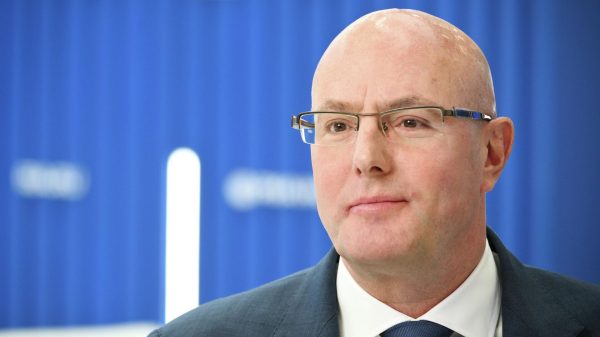 ECB President Christine Lagarde says the central bank is not “moving into a callback phase”; despite the rate cuts. Photo: Alex Kraus/Bloomberg
ECB President Christine Lagarde says the central bank is not “moving into a callback phase”; despite the rate cuts. Photo: Alex Kraus/Bloomberg
Christine Lagarde warned that the European Central Bank's fight against inflation is far from over even after policymakers announced the first interest rate cut in five years.
At a major turning point : The ECB president said all but one of his officials supported cuts to all three key interest rates, cutting the benchmark deposit rate to 3.75% from 4% in the first cut since 2019.
However, Ms Lagarde made it clear that the central bank was «not entering a recovery phase», suggesting that future rate cuts would depend on the strength of the labor market and wages.
Still < The move suggests borrowing costs in Europe are likely to diverge further from the US Federal Reserve, where a strong labor market has led traders to abandon hopes of more than one US interest rate cut this year.
It will also put more pressure on the Bank of England to start cutting rates this summer.
The Monetary Policy Committee (MPC) raised interest rates to a 16-year high of 5.25. PC last August and has been storing them there ever since.
While the long-awaited move has already helped boost Europe's weakening housing market, economists have warned the ECB not to «declare victory over inflation.»
Wearing a gold necklace with the words «responsible», Ms Lagarde agreed the fight was not over, stressing that decisions on future rate cuts would be made «meeting by meeting».
«Let there be no doubt about our determination to curb inflation and restore price stability,” she told reporters on Wednesday.
“One thing I've learned in this job is that we have to be persistent. We must be decisive, we must depend on data, but we cannot give up on purpose.
“And our goal is to tame inflation and return it to 2% in the medium term.
While Ms Lagarde acknowledged that the task of containing inflation had led to «sleepless nights», she said there was also a risk that inflation could fall much faster.
Noting that inflation has halved every year for the past two years. years to 2.6% today, Ms Lagarde added: “I don’t want to halve inflation again. We don't want to go there.»
 Ms. Lagarde wore a gold necklace that read ' responsible' when she announced the ECB's decision. Photo: Alex Kraus/Bloomberg
Ms. Lagarde wore a gold necklace that read ' responsible' when she announced the ECB's decision. Photo: Alex Kraus/Bloomberg
Analysts say pressure on wages in the bloc is likely to keep inflation high for longer, limiting the number of rate cuts this year. Ms Lagarde said politicians were keeping a close eye on wages.
“Wages matter enormously,” she said.
It also comes as borrowing costs fall globally as Switzerland became the first major Western economy to cut interest rates in March, cutting its key interest rate by 0.25 percentage points to 1.5%.
The ECB said the decision to cut borrowing costs reflected a «noticeable» easing in price pressures in the economy: inflation now stands at 2.6%, down from a peak of 10.6% at the end of 2022.
However , while acknowledging that high inflation has not been overcome, policymakers acknowledged that “domestic price pressures remain strong” and inflation is “likely to remain above target even next year.”
The ECB now believes that inflation will will average 2.5% this year, down from 2.3% in its last forecast in March.
Price growth is expected to average 2.2% in 2025, up from the previous forecast of 2%. This means inflation will not return to the 2% target for more than a year.
Core inflation, which strips out food and energy price volatility, is also expected to remain elevated for an extended period, with growth forecast to rise to 0.9% this year, down from a previous forecast of 0.6%.
Policymakers said high interest rates remained a drag on economic growth as they pledged to keep them elevated «for as long as necessary to achieve that objective.»
This is a sign that the ECB's actions are not the beginning of economic growth. Following a series of rate cuts, the central bank said it would “follow a data-driven approach at each meeting to determine the appropriate level and duration of restrictions.”
“Despite progress in recent quarters, domestic price pressure remains strong as wage growth picks up and inflation is likely to remain above target well into next year,” the company said in a statement.
Yael Selfin, chief executive. economist at KPMG, said the ECB was right to take a cautious approach.
She said: “The eurozone economy is in a different place to the US economy, which is exposed to renewed inflation and looser financial regulation. position.
“However, the European labor market remains relatively tight, with unemployment at its lowest level since the introduction of the euro and wage growth remaining elevated.”
ECB data shows annual wage growth among workers who collectively negotiate pay rises in the last quarter of 2023, the figure was 4.5%, up from 4.7% in the previous quarter.
G- Ms Selfin added: “ECB officials stressed that the rate cut should not be interpreted as a declaration of victory over inflation.
There are signs that UK policymakers are also becoming increasingly concerned about the need to support economic growth.
But hopes for the move were dashed this month by inflation data, which showed the economy was cooling more slowly than expected due to inflation. will fall to 2.3% in April, slightly above the Bank's own forecast of 2.1%.
Rishi Sunak's hopes of pre-election support from the Bank are also likely to be dashed. Since he became independent in 1997, he has not cut rates in the weeks leading up to an election.
There remains wide disagreement among the nine rate-setting bodies on Threadneedle Street, with two politicians already calling for rate cuts and Gov. Andrew Bailey saying cuts are «on the way» but others suggesting any reduction is still a long way off.
The key factor for the bank is wages. Wage growth remains stubbornly strong, although unemployment is at its highest level in almost a year at 4.3%, according to the Office for National Statistics (ONS).
Joe Nellis from the Cranfield School of Management said that while the ECB's actions signal that the rate-cut cycle is already well under way, policymakers on both sides of the Atlantic are likely to , will remain cautious.
He said: “With Canada cutting rates on Wednesday, expectations will grow that the UK and US will soon follow suit. The big question is when this will happen.
“However, the Bank of England, together with the ECB, will have to ensure that they do not fire the starting pistol too quickly and cause a new surge in inflation.”





















































Свежие комментарии